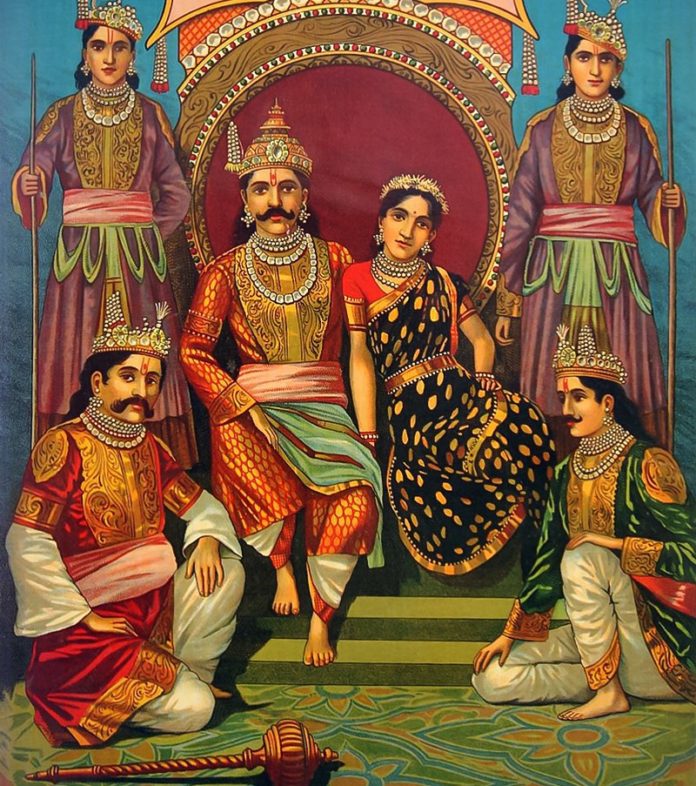By Upendra Mishra
BOSTON—If you’re lucky, I mean really lucky, you will fall in love—a love that merges two people together forever, and in such a way that life is never the same after. If you’re not the lucky one but have tasted even a tiny bit of the eternal love, you will keep looking for it for the rest of your life. Your hankering will never go away.

I call it the unfinished love, a love that never dies—no matter how old you become. You will remain frozen in that special moment and place where you met the very first time, that very moment your eyes pierced into each other, that gust of fragrance, that burst of laughter and everything from that moment onwards. You will always go back to the first time you touched each other’s hand, or held each other or walked with, or sat down or did a few simplest things, or the song you listened to together.
The beauty of unfinished love is that even the passage of time touches neither love nor you, your age does not scare you and nobody can take love away from you—not even you.
You will be eternally frozen in your “heart age” as a friend of mine calls it. It is just there and will always be there: pure, pristine, simple, genuine and real. You can only feel and experience it; and you know for sure that there is nothing powerful enough to taint it.
Why?
The word love and romance bring a feeling of excitement, exuberance, beauty, mystery, sadness, solitude, cheerfulness, inner joy, remoteness and calmness from everyday life. Sometimes we are alone in our romantic journey, sometimes with someone we love or wanted to love, sometimes with just have a longing for someone and sometimes for someone whom we lost forever.
The root of love and romance always, however, is innocence. Romance is when we are truly living our inner life outside and when our innocence peeks out and we are living, experiencing and touching that with our bare fingers—and all this while no one else is watching. It is also love. You are loving someone even when that person may or may not be aware of it. It is wonderful journey.
A few years ago, I was talking about the moon and romance at a musical program in Boston. As soon as I finished my talk, the master of the ceremony stopped me and asked a surprise question about love. I still remember that evening vividly as well as my answer. I paused for a moment, and looked back at my journey of unfinished love.
I remember saying that there are four types of love. First, you just fall in love with someone. This, in itself, is a great experience. The second type is when you fall in love and you marry that person. The third one is when you fall in love, you marry the same person and stay fallen in love through the rest of your life with the same person. The fourth one is probably the highest quality of love: you fall in love and never marry your love. When I mentioned the fourth type, the audience chuckled. I explained that in the fourth category, the unfinished love becomes your own private island where you can visit any time, and when you visit that island you find that the love there is exactly the way you had the first time. In a way, the unfinished love become immortal.
But what is love? Are you fit to love? Are you capable of being loved? We all know that love is the most basic foundation of life. Without love, there will be nothing: no happiness, no birth, and no purpose in life.
Since my teenage years, the meaning of love has always fascinated me. I have also discovered that with the passage of time the definition of love also changes. Sometimes, love becomes complete possession, sometimes jealousy, sometimes everything and sometimes “ekla chalo re” or march alone—depending on our mood and the state of mind. In the end, “ekla chalo” is just the opposite of love. Love is belonging, sharing, caring, asking for help, forgiving and sometimes asking forgiveness.
Moreover, loves comes in various shades: motherly love, romantic love, family love, pure friendship and just loving someone because just you want to love and you feel good being with that person. But the root of all love is the same: you must be full of love yourself first.
If you think you are enough yourself, you are fit to love. If you think, you are enough, you are capable of being loved. But if you are pleasing people all the time and wasting your time and energy in being perfect, you are unfit for both. The reason I am saying this because at some point of my life, perfection was a driving force in my life. When it came to perfection, I was willing to give up everything, including love. Yes, those addicted to perfection can give up everything. Perfection is a terrible addiction.
When talking about perfection, one mythological character comes to my mind: Yudhishthira of Mahabharat. His belief in being the perfect righteousness king blinded him so much that he gambled his kingdom, brothers and even his wife.
In “The Palace of Illusions,” which is written as a fictional memoir by famous Mahabharata character Draupadi by Chitra Banerjee, Draupadi is one day reflecting upon her relationship with the five Pandava brothers who all were married to her at the same time. When she talks about Yudhishthira, Draupadi says: “A well-meaning man is more dangerous because he believes in the righteousness of what he does. Give me an honest rascal any day.”
As I was thinking about writing this column after recently writing “Pearls of Wisdom: The Power of Vulnerability, Weakness and Imperfection,” I listened to a fascination interview of Elizabeth Tallent about her new memoir, “Scratched,” on NPR with Scott Simon. In Scratched, Tallent recounts her lifelong struggle with perfectionism. She is an acclaimed novelist and short story writer who teaches creative writing at Stanford University.
“I attached a great deal of importance to being as perfect as possible with the notion that if you couldn’t come across as perfect, there might be pretty dire consequences. So I internalized the perfectionism and directed it at all kinds of things throughout my life,” Tallent told Simon. “From my vantage point, the part of perfectionism that’s devastating is – isn’t the formulation of exceedingly high ideals, but it is the self-abuse that’s associated with the perfectionism. So the torrent of self-recrimination – because there was a lot in my existence then and maybe in the entire sort of suburban existence that suggested you could achieve perfection.”
Tallent said that perfectionism can be exhausting because you are not in a relationship with reality.
“So the things that would sustain you in reality, like the oddity and beauty of other people’s personalities – they have a hard time getting through to you. And you’re very alone with this dictatorial force. I think exhaustion is a big part of it. I think there – it can be associated with a higher risk of suicide,” Tallent added during the NPR interview.
The other killer of love is: “What will people think?”
In The Gift of Imperfection, shame researcher Brene Brown defines love as follows: “We cultivate love when we allow our most vulnerable and powerful selves to be deeply seen and known, and when we honor the spiritual connection that grows from that offering with trust, respect, kindness, and affection. Love is not something we give or get; it is something that we nurture and grow, a connection that can only be cultivated between two people when it exists within each one of them—we can only love others as much as we love ourselves. Shame, blame, disrespect, betrayal, and the withholding of affection damage the roots from which love grows. Love can only survive these injuries if they are acknowledged, healed, and rare.”
Sadly, the eyes of perfectionism don’t want to imperfection and vulnerabilities, and thus fail to see true love as well. We love others only after we love ourselves first (I don’t mean narcissistic love). We make loved ones happy only when we ourselves are full of happiness—just as the ocean never empties itself no matter how much water evaporates from its surface and similarly there is always a space in the space.
(Mr. Mishra is managing partner of the Waltham, MA-based integrated inbound marketing and PR firm The Mishra Group. He writes about his three passions: marketing, scriptures and gardening.)















